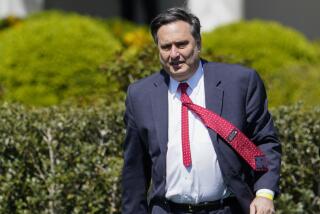Kirkland to Quit in August in Bid to Block Opposition : Labor: Donahue, No. 2 at AFL-CIO, will probably take reins, but move may be too late to get him elected.
- Share via
Seeking to blunt a dissident group’s historic effort to seize control of the American union movement, embattled AFL-CIO President Lane Kirkland announced plans Monday to resign Aug. 1 in hopes of opening the way for his longtime second in command, Thomas R. Donahue, to take the organization’s reins.
The move was designed to try to give Donahue, 66, the top job on an interim basis and thus boost his chances of winning election in late October to a regular two-year term.
But despite the unparalleled nature of the resignation in the 40-year history of the AFL-CIO, many union observers called it a last-ditch maneuver that probably came too late to enable Donahue to defeat the dissidents and win a full term as president.
Meanwhile, the dissidents were getting ready to officially announce today the three candidates heading their slate. The ticket includes a Latina labor leader who, if elected, would be the first woman or minority to reach the top elected ranks of the AFL-CIO.
The power battle that spurred Kirkland, 73, to step down is probably the fiercest struggle within the American labor movement since the 1930s, when the Congress of Industrial Organizations broke away from the American Federation of Labor and formed a rival organization. The two groups reunited to form the current AFL-CIO in 1955, which since has had only two presidents: George Meany and Kirkland.
Donahue’s bid to succeed them will be contested by the leaders of the increasingly powerful dissident group--whose unions include the nation’s two biggest, the Teamsters and the American Federation of State, County and Municipal Employees. Together, the dissidents claim the support of more than 20 organizations representing 60% of the AFL-CIO’s 13.3 million members.
Observers said Donahue alienated many of his backers by rejecting their previous overtures for him to challenge Kirkland.
“The leaders of the dump-Kirkland movement had reached out to Donahue on at least three occasions and he turned them down. Now, at the last second, he’s seeking their support? I don’t think they’re going to listen to him,” said Matthew Tallmer, editor of two newsletters that track labor issues.
Donahue, in a prepared statement, said he had announced earlier that he would retire this fall from the AFL-CIO based on Kirkland’s previous plans to run for a ninth consecutive term. With Kirkland’s decision to bow out, however, Donahue said he has the “unique capacity” to unite the union movement.
To do that, however, Donahue would have to defeat his old friend John J. Sweeney, 61, president of the 1.1-million-member Service Employees International Union. As rumored for weeks, Sweeney--who was hired by Donahue at the SEIU in the 1960s--will be named the opposition group’s candidate for president. Also slated for the ticket are Richard L. Trumka, 45, president of the United Mine Workers, who would run for Donahue’s current secretary-treasurer post, and Linda Chavez-Thompson, 50, who is slated as a candidate for what would be a newly created position at the AFL-CIO, executive vice president. She currently serves on the AFL-CIO’s 35-member executive council.
Although Donahue appears to face an uphill battle for victory to a two-year term in October, his prospects for gaining the presidency on an interim basis in August appear brighter.
More to Read
Get the L.A. Times Politics newsletter
Deeply reported insights into legislation, politics and policy from Sacramento, Washington and beyond. In your inbox twice per week.
You may occasionally receive promotional content from the Los Angeles Times.










